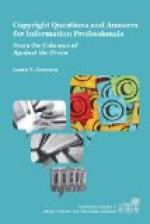I therefore take this means of presenting the true position of literary copyright in Canada, a subject which is but little understood, and upon which the Executive and the Council apparently did not desire enlightenment.
Under the British Copyright Laws, which extend to Canada, a British or Canadian author of a literary work has the undisputed right to his manuscript; he may withhold, or he may communicate it, and in communicating it he may limit the number of persons to whom it is imparted, and impose such restrictions as he pleases upon the use and printing of the work. Foreign reprints of such a work cannot be imported into Canada. Canadian publishers are just as free to deal with authors under the British Copyright Laws as publishers in the United Kingdom, and are, therefore, on the same footing as the British publishers.
Prior to 1847, it was a common complaint in Canada that, owing to the provisions of the Imperial Copyright Act, a sufficient supply of English literature could not be obtained, whilst the reading public in the United States were well supplied with the best English books in cheap form. To remove this ground of complaint, the Imperial Parliament passed the Foreign Reprints Act (1847), under which Canada was permitted to import cheap pirated editions of British works produced in the United States, on an undertaking to collect a Customs duty thereon of 12-1/2 per cent., which was to be paid over to the British Government for the benefit of the authors interested. The results of this legislation were unsatisfactory to the British authors, few of whom received any benefit under the provisions of the Act. The sums collected were ridiculously small. In 1894, they amounted to $1,433.66, and in 1895, to $2,211.33. Whilst the arrangement was in existence, British copyright works were openly printed in the United States, and imported into Canada without payment of the duty, to the exclusion of British editions. So long as this arrangement remained in force, a British copyright owner could not prevent the importation into Canada of pirated editions of his work, unless he reprinted the work in Canada and copyrighted it under the Canadian copyright laws. The arrangement was terminated by the Canadian Parliament in 1895 at the instance of Sir John Thompson.




